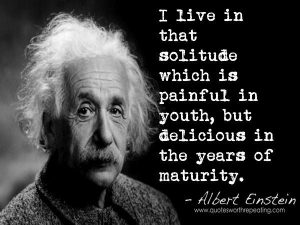Many researchers and medical scientists have proved the upshot of loneliness is negativity of mind: there are growing evidence when our need for social relationships is not met, we fall apart mentally and even physically. Loneliness affects the brain and the body. Some effects of loneliness work subtly through the exposure of multiple body systems to excess amounts of stress hormones. Over some time, a lonely person’s unmet social needs take a serious toll on health, eating into our arteries, creating high blood pressure, and even undermining learning and memory. Loneliness is a negative state of mind which is marked by isolation. Some people experience loneliness in spite of being surrounded by people; which is possibly the bitterest form of loneliness.
Today, in our society we consider ‘not be busy’ as despicable. People misunderstand being busy with worthiness, popularity, and success. Complaining about being busy and working all the time is such a humdrum which most of us do it without thinking. We funnily derive our self-esteem from what others think about us…we look up to the tags given by other to us. We put in efforts to satisfy others, so that in turn they satisfy our egos.
On the other hand, solitude is the state of being alone without feeling lonely. I t leads to self-awareness. Sometimes, we need to be left alone, this aloneness is chosen by a conscious choice by an individual for quiet solitude, and it does not carry with it the negative emotional conditions associated with loneliness. Solitude is a time for personal reflection. People who are artists, intelligent and creative need time to live alone to accomplish their goals.
t leads to self-awareness. Sometimes, we need to be left alone, this aloneness is chosen by a conscious choice by an individual for quiet solitude, and it does not carry with it the negative emotional conditions associated with loneliness. Solitude is a time for personal reflection. People who are artists, intelligent and creative need time to live alone to accomplish their goals.
Solitude allows our body to catch up with our mind: We over use our mind and body thinking, analyzing, contemplating and planning always; only when we take a pause or stop and get off the merry-go-round of daily life, our mind and body can once again get back into sync. Body gives signals often to slow down, which solitude offers.
Solitude allows brain to rest: In an over stimulated world, our minds are constantly in an overactive mode. Solitude allows mind to detach from the entire endless rattle coming from the environment around us: the radio, TV, mobile, newspapers, Internet, the hustle bustle, traffic noise on street and chattering of others. When we get some time for self, our muscles relax, blood pressure decreases, and heart rate slows. Solitude is the anti-adrenaline system that kicks off when we just relax.
Solitude prevents burnout: We keep struggling with multitasking job, career, socialising which creates prolonged, intense and unresolved stress. We literally run out of physical and psychological energy, due to which we get disorganized, inefficient, and become erratic.
Solitude enhances creativity: It frees the mind up from the commotion of everyday life and allows it to focus more fully on one thing. It allows the brain to think outside the box and to come up with inimitable, extraordinary solutions to ordinary problems. That is the reason why artists such as painters, sculptures, musicians, authors, lyricists and researchers spend a lot of time being alone.
Solitude helps in self-discovery: It gives us a chance to learn something about ourselves, in my opinion self-discovery is a process that involves asking and answering basic questions: who am I? What am I doing? Where is my journey taking me? Am I at ease with myself? Solitude allows dealing with these pertinent questions in life. It is therefore important for our internal growth, it restores body and mind. Sometimes it’s better to choose to be lonely. The quieter we become, the more we can hear.














































